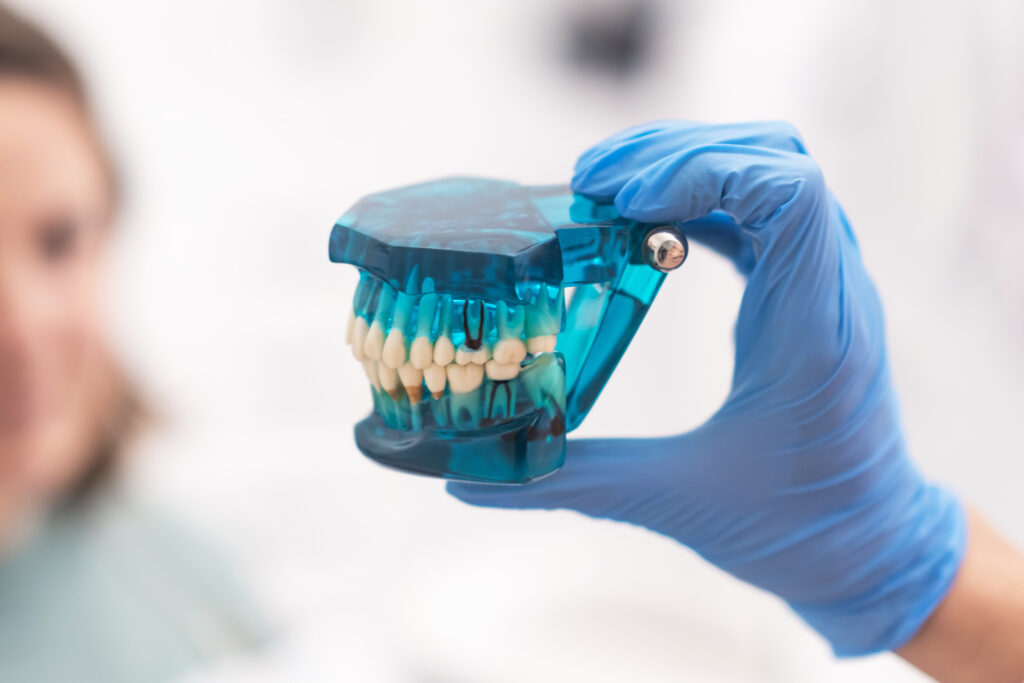A correct diagnosis and proper planning are essential for the success of dental implant treatment. Before undergoing this procedure, it is important to consider several factors, such as your medical history, the quality of available bone, dental evaluation, and prosthetic options. These considerations are key to ensuring that you obtain satisfactory results for your smile.
Importance of replacing missing teeth
Replacing missing teeth is not only important for maintaining good oral health, but also for improving the function and aesthetics of your smile. When someone has missing teeth, they may experience a number of problems that affect their daily quality of life.
Effects on oral health
Tooth loss can cause a series of oral health problems. When a tooth is missing, the remaining teeth can move and change position, which can alter your bite and chewing ability.
Additionally, empty spaces between teeth can be prone to food and plaque buildup, increasing the risk of cavities and gum disease.
Effects on function and aesthetics
Teeth play a crucial role in chewing function and the ability to speak correctly. When teeth are missing, these functions are compromised, making it difficult to properly chew food and pronounce words clearly.
Additionally, missing teeth can affect the aesthetics of the smile, which can have a negative impact on a person’s confidence and self-esteem.
Changes in facial structure
Teeth are not only important for chewing function and smile aesthetics, but they also play a role in facial structure. When teeth are lost, there may be a decrease in bone volume in the jaw and maxilla, which can lead to changes in facial appearance, such as loss of lip and cheek support.
To solve these problems, dental implants are a highly recommended option. Implants are artificial structures that are placed in the jawbone or maxilla, and then a prosthetic dental crown is attached to them.

Considerations before starting dental implant treatment
Before undergoing dental implant treatment, it is crucial to perform a thorough evaluation of your oral and general health. This involves considering your medical history, evaluating the quantity and quality of bone available for the implant, as well as your commitment to proper care and maintenance.
An oral and general health evaluation will identify any existing medical or dental conditions that may affect the success of dental implant treatment. It is important that you inform your dental professional about any illnesses, medical conditions, or medications you are taking.
The quantity and quality of bone available in your jaw or maxilla is a determining factor for the success of the dental implant. Sufficient, healthy bone is necessary to provide a solid and stable base for the implant. In some cases, bone grafting may be necessary to improve bone quantity and quality.
In addition to the health and bone evaluation, it is essential that you consider your commitment to proper care and maintenance after implant placement.
This involves following good oral hygiene, including regular brushing, flossing, and regular visits to the dentist. Commitment to a proper care routine will help preserve the health of your dental implants in the long term.
Not all patients are suitable candidates for dental implants. Factors such as smoking, advanced periodontal disease, or certain medical conditions may influence the suitability of implants as a treatment. It is essential that your dentist evaluate your case on an individual basis and determine if you are a suitable candidate for treatment.
Plan your dental implants treatment correctly
Proper diagnosis, thorough evaluation, and careful planning are key elements to achieving successful results for your smile. Likewise, it is essential to have a complete radiological study and receive quality dental care to ensure satisfactory results with dental implants.
If you are looking for a long-term solution to regain your full, healthy smile, dental implants are a reliable option. However, it is important that you consult a trusted professional, who will be able to evaluate your specific case and provide you with all the necessary recommendations to achieve the success of your treatment.


